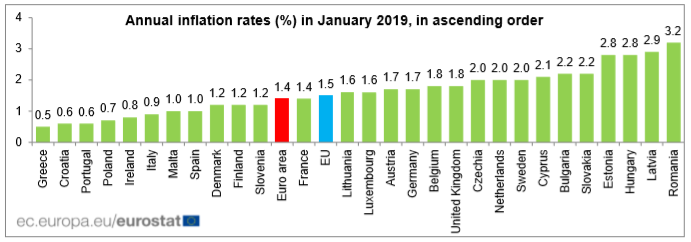HuffPost, (2019), “CEP: Η Ελλάδα μεταξύ των κερδισμένων από το ευρώ (ως το 2011)”, 27 Φεβρουαρίου Η Γερμανία και η Ολλανδία είναι οι μεγάλοι κερδισμένοι από το ευρώ, 20 χρόνια μετά την εισαγωγή του, ως προς την ενίσχυση της ευημερίας τους, σύμφωνα με έκθεση του Κέντρου Ευρωπαϊκής Πολιτικής (CEP)- με μεγάλους χαμένους την Ολλανδία και την Ιταλία, όπως αναφέρεται σε σχετικό δημοσίευμα της Deutsche Welle. Η Ελλάδα είναι μεταξύ των …Read More
The ECB has reached its political limits. Its consequences in eight charts
Ashoka Mody, (2019), “The ECB has reached its political limits. Its consequences in eight charts”, VoxEU, 11 Φεβρουαρίου In this post, Ashoka Mody documents the costs of ECB timidity, which, he argues, arises from the political limits on its actions. Σχετικές Αναρτήσεις Ferdinando Giugliano, (2019), «The ECB Has Policy Makers, Not Superheroes», Bloomberg, 22 Φεβρουαρίου Marcus Ashworth, (2019) «ECB Is Awake and Asleep at the Same Time», Bloomberg Opinion, 19 …Read More
The financial transmission of housing bubbles: evidence from Spain
Alberto Martín, Enrique Moral-Benito and Tom Schmitz, (2019), “The financial transmission of housing bubbles: evidence from Spain”, ECB Working Paper Series No 2245, Φεβρουάριος How do housing bubbles affect other economic sectors? We show that in the presence of collateral constraints, a bubble initially raises housing credit demand and crowds out credit to non-housing firms. If the bubble lasts, however, housing credit repayments raise banks’ net worth and expand credit …Read More
Η Ευρωζώνη σε επιβράδυνση, η Ιταλία σε ύφεση
Ζωρζετ Ζολώτα, (2019), “Η Ευρωζώνη σε επιβράδυνση, η Ιταλία σε ύφεση”, Η Καθημερινή, 23 Φεβρουαρίου Η Ιταλία είναι η μοναδική χώρα-μέλος της Ευρωζώνης που παγιδεύτηκε σε ύφεση στα τέλη του 2018, αντανακλώντας την αστάθεια που προκλήθηκε από τις πολιτικές εξελίξεις σε μια οικονομία που είχε αρχίσει να βαδίζει σε στέρεο έδαφος ύστερα από καιρό. Η τεχνητή ύφεση στην ιταλική οικονομία δεν αποδίδεται μόνον στο γενικευμένο κλίμα αβεβαιότητας που επικρατεί στην …Read More
Ευρωπαϊκή Κεντρική Τράπεζα: Σε κρίσιμο σταυροδρόμι μετά την κατάργηση του QE
Γιάννης Αγγέλης, (2019), “Ευρωπαϊκή Κεντρική Τράπεζα: Σε κρίσιμο σταυροδρόμι μετά την κατάργηση του QE”, Capital.gr, 24 Φεβρουαρίου 2019 Η συγκλίνουσα εκτίμηση των οικονομικών αναλυτών που παρακολουθούν προσεκτικά τη νομισματική πολιτική της ΕΚΤ, είναι ότι τα περιθώρια παρέμβασης του κ. Ντράγκι έχουν περιορισθεί σχεδόν αποκλειστικά στα όρια της αναχρηματοδότησης των ευρωπαϊκών τραπεζών, όσον αφορά τα δάνεια TLTROs. Η αιτία της αναγκαστικής παρέμβασης προβάλλει πλέον με μεγάλη σαφήνεια από τα πρακτικά της …Read More
Annual inflation down to 1.4% in the euro area
Eurostat/Annual inflation down to 1.4% in the euro area /22 Φεβρουαρίου 2019 The euro area annual inflation rate was 1.4% in January 2019, down from 1.5% in December. A year earlier, the rate was 1.3%. European Union annual inflation was 1.5% in January 2019, down from 1.6% in December. A year earlier, the rate was 1.6%. These figures are published by Eurostat, the statistical office of the European Union. Σχετικές …Read More
Solidarity in the Eurozone
Pavlos Eleftheriadis, (2019), “Solidarity in the Eurozone”, Bank of Greece Working Paper 256, Ιανουάριος Proposals for Eurozone reform aim to complete its institutional architecture by securing stability without creating moral hazard. Such policy arguments inevitably rely, however, on implicit assumptions about justice, or on what is owed to whom. A common assumption is that member states are solely responsible for what happens to them. This paper, written from the point …Read More
Should the ECB care about the euro’s global role?
Benoît Coeuré, (2019), “Should the ECB care about the euro’s global role?”, VoxEU, 25 Φεβρουαρίου There is a growing debate in Europe as to whether recent shifts in global governance should be seen as a reason to strengthen the global role of the euro. This column explains that while the ECB does not take a view on foreign policy questions, the alignment between policies that will strengthen the euro’s global …Read More
Interest rate risk in the euro area
Peter Hoffmann, (2019), “Interest rate risk in the euro area”, ECB Research Bulletin No. 55, 22 Φεβρουαρίου Challenging conventional wisdom, recent research shows that, collectively, euro area banks have limited exposure to interest rate risk, but that their individual exposures vary significantly from institution to institution. Differences in interest-rate setting conventions for loan contracts, especially mortgages, across euro area countries have been shown to be an important driver of this …Read More
Αλλάζουν ρότα οι κεντρικές τράπεζες σε ΗΠΑ, Eυρώπη και Ασία
Ζωρζετ Ζολώτα, (2019), “Αλλάζουν ρότα οι κεντρικές τράπεζες σε ΗΠΑ, Eυρώπη και Ασία”, Η Καθημερινή, 21 Φεβρουαρίου Οι κεντρικές τράπεζες στις ΗΠΑ, στην Ευρώπη και στην Ασία στρέφονται σε μια πιο χαλαρή στάση ως προς τη χάραξη νομισματικής πολιτικής, καθώς ο εμπορικός πόλεμος ΗΠΑ – Κίνας, το Brexit και άλλες παράμετροι έχουν αφήσει αρνητικά σημάδια στην παγκόσμια οικονομία. Εχει ήδη υπάρξει επιβράδυνση της ανάπτυξης στην Κίνα και την Ευρώπη. Μετριάζονται, …Read More





